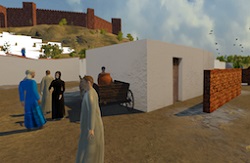New application makes language formulation fun
Language is a crucial skill for children just entering school. Unfortunately, parents have limited resources for evaluating whether their child’s language development is on track for their age or whether intervention is needed. As a result, too many language development problems go undetected for too long. “Early identification and intervention are universally agreed to be the critical factors in addressing many childhood developmental issues,” says Shona D’Arcy, CEO and founder of Kids Speech Labs(opens in new window), a company focused on supporting child speech and language development. To equip parents to better recognise – and address – language development issues, Kids Speech Labs has launched Speech Scout(opens in new window), a voice-activated word game for children between ages 3 and 5. The programme was developed with the support of the EU-funded SMARTSLT project. “We want to improve access to children’s speech and language services, ensuring that no child slips through the cracks and falls behind in school because of poor communication skills,” adds D’Arcy. “Speech Scout is designed to catch speech and language delays as soon as they begin to show in the home.”
A first-of-its-kind digital tool
Speech Scout, the first game released by Kids Speech Labs, is a first-of-its-kind digital tool to support the early stages of language formulation. It utilises a combination of automatic speech recognition technology and artificial intelligence to help parents evaluate problems and support the proper speech development of their child. “As a disruptive technology, it is really important to be able to demonstrate the potential of this groundbreaking technology to stakeholders – particularly those that have not yet embraced such technology,” explains D’Arcy. This is where the EU funding came into play. Through the SMARTSLT project, Kids Speech Labs was able to develop and release a working prototype of the game, test it with real users, and evaluate its market potential. “The project’s goals were to assess how well we could collect and process children’s speech samples through a fun, interactive app,” notes D’Arcy. “We also wanted to understand how best to commercialise the application.” The project helped Kids Speech Labs identify the technical requirements for a more scalable release, including usability issues for the interface and data management. The project also tested the use of parenting websites as a route to market. “All of this work enables us to plan our marketing strategy for future releases,” says D’Arcy.
Commercialisation on the horizon
Although still in the testing phase, 60 parents have already signed up to use Speech Scout. “In the current version of the game, parents receive an overview of their child’s pronunciation skills after just four sessions,” concludes D’Arcy. “As our technology continues to develop, parents will be able to use this information to make informed decisions about their child’s speech and language needs.” The Kids Speech Labs team is currently finalising the clinical validation of the game, with commercialisation expected to follow in early 2021. The team is also developing a product geared towards primary care speech therapists.







